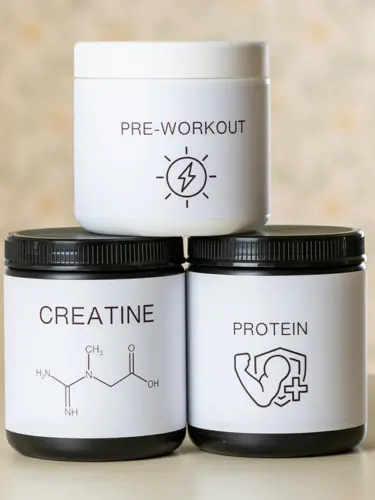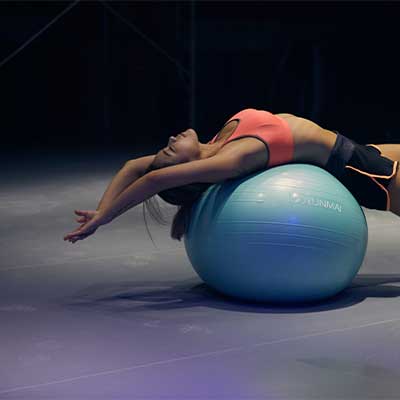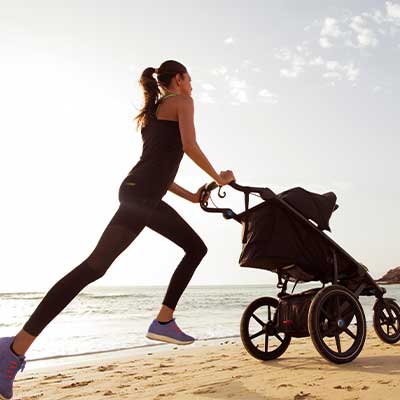Last Updated on August 1, 2024 by Nicole
With summer around the corner, a goal for fitness enthusiasts and beginners alike is to slim down or tone the midsection. Whether you want a six-pack, a few more inches off your already slender waistline, or just overall improved stability, body weight ab workouts ab or weighted core exercises will give you the results. Aside from a healthy diet and a low body fat percentage, it would help if you also understood how to develop your abdominal musculature to achieve your aesthetic/strength goals for this summer and beyond.
Using body weight ab workouts, you can go above and beyond your fitness goals. Below I will discuss the best way to train your abdominal and oblique muscles, share exercises that are proven to give excellent results, and finally include a made-for-you ab circuit with oblique exercises for both beginners and those who are more advanced.
It is well-known that the catalyst for muscle growth lies in Progressive Overload. This is the principle of gradually increasing stress on a muscle or group of muscles over some time to achieve greater muscle development. If you’ve read my previous articles on this blog about toning, you will know that building muscle is the key. This is especially true for women. Due to female hormones and bone structure, it is much less likely that women will build bulky or blocky muscles (assuming no use of performance-enhancing drugs, which can be highly dangerous).
Applying Progressive Overload
This principle of Progressive Overload applies to all muscle groups, including the ever-popular abdominal region. However, there is a common misconception that you need machines or fancy equipment to develop a defined midsection. Yes, those modalities can help, but they are not mandatory.
One study found that the “V Sit Up” exercise (described below) performed separately with four different pieces of equipment (TRX, slide board, exercise ball, and Power Wheel) elicited no greater core activation than performing this same exercise by just lying on your back (supine position) and utilizing your body weight (1).
Download our free bodyweight exercise cheat sheet and try out these 30 simple fat-burning, muscle-defining exercises.
Another belief is that you do not need ab and oblique specific exercises to have a strong, developed core, as you can simply perform functional exercises that will give you the same results. Generally, this is true. You will engage your core by performing functional exercises like squats, deadlifts, and lunges.
However, you must also include ab and oblique exercises if you want to develop your mid-section to its full potential. What’s the best way to develop your core? Effective body weight ab workouts. One study found that three isolated core exercises achieved greater core activations than those of three variations of lunges (2), which are compound exercises.
Implementing a comprehensive, core-strengthening program should incorporate a variety of isolation exercises that progress into more advanced integrative movements. Isolation exercises are single-joint movements that target just the muscles of the core. Integrative exercises are multi-joint movements that require a greater amount of balance and coordination to be performed properly.
These integrative exercises elicit greater core activation by requiring you to engage distal (farther apart) core muscles simultaneously. By incorporating both isolation and integrative exercises, you’re challenging both your sensory and balance systems to allow for a greater muscle activation rate (6).
But first, let’s take a look at the muscles that make up the mid-section and their functions (3):
Transverse Abdominis:
The Transverse Adbdominis is the deepest of all the abdominal muscles. The main job of this muscle is to compress the abdomen and maintain spinal stability. Although this muscle is too deep to be visible, it is extremely important to maintain the health of your lower back, especially when it’s under a heavy load.
Rectus Abdominis:
This is the top layer of muscle seen when referring to someone’s “6-pack”. This muscle also compresses the abdomen and flexes the trunk forward.
External Obliques:
This is the muscle group you see on either side of the Rectus Abdominis that may look like an extra set of ribs – the kind that the Spartans have in the movie 300. We have a set of external obliques on the right and the left. When working at the same time, the function is to flex the trunk forward and compress the abdomen. They can also operate separately from one another by performing the same side trunk flexion (bending) or rotation in the opposite direction. For example, if my right External Obliques are engaged, I will either bend to my right or turn my trunk to the left.
Internal Obliques:
These muscles lie underneath the External Obliques and are on both sides of the Rectus Abdominis. They function like the External Obliques: when contracting both sides together, they flex the trunk forward and compress the abdomen. When the muscles contract separately, they too perform same-side trunk flexion (bending). However, unlike the External Obliques (which help you rotate in the opposite direction), these muscles allow you to rotate to the same side. For example, if my Right Internal Obliques are engaged, I will either bend to my right or turn to my right.
Now that you know the location and function of each abdominal muscle group, we’re going to go through the ab and oblique exercises that will get you the best results utilizing your body weight.
Body Weight Ab Workouts:
Traditional Crunch
This is the simplest of the body weight ab workouts that will engage the Rectus Abdominis during a crunch exercise.
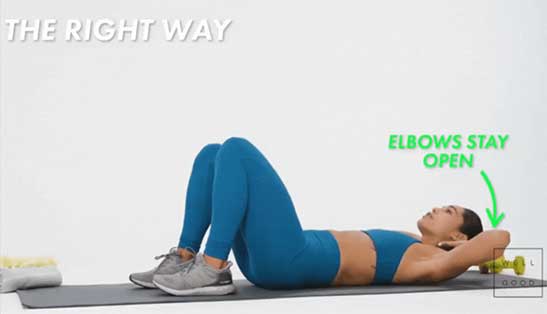
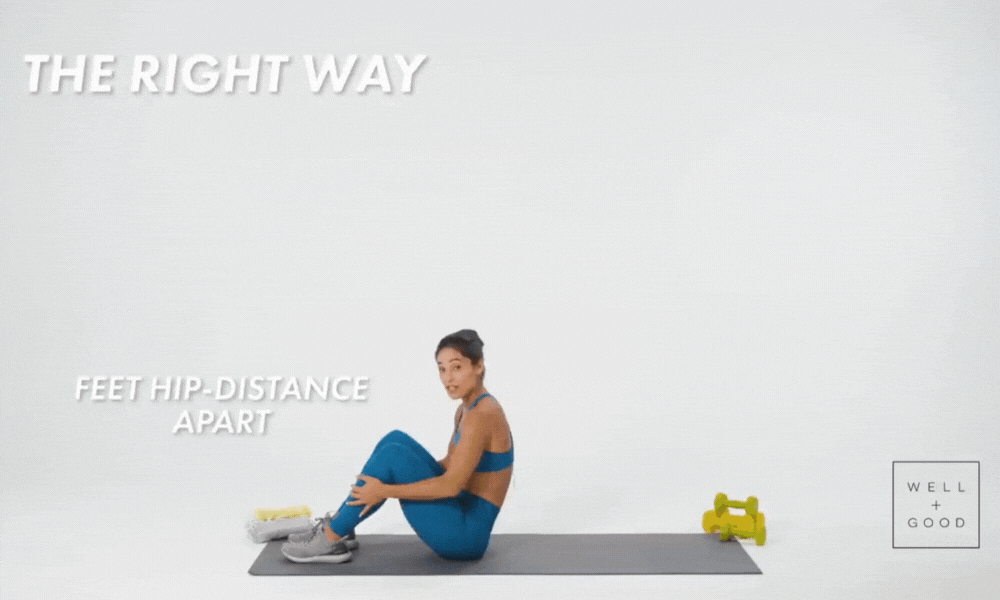
Traditional Crunch Demo!
Instructions:
- Face up on a mat with knees bent, feet planted on the mat, and arms parallel to your torso.
- Engage your core by drawing your tummy in and pelvic floor muscles (those that stop you from peeing) up.
- Put your tongue on the roof of your mouth; this will stop the muscles in the front of your neck from overworking.
- Tuck your chin gently towards your chest and lift your shoulders and shoulder blades off the mat. Keeping your feet planted on the ground and core engaged, lift your torso as far toward your knees as you can.
- Lower back down with control so that your shoulder blades are once again on the mat.
Advanced Crunch
When performed with proper technique, this position while crunching has been shown to activate the top portion of the Rectus Abdominis more than any other crunch variation (4). This is one of the greatest bodyweight ab workouts: simple and effective.
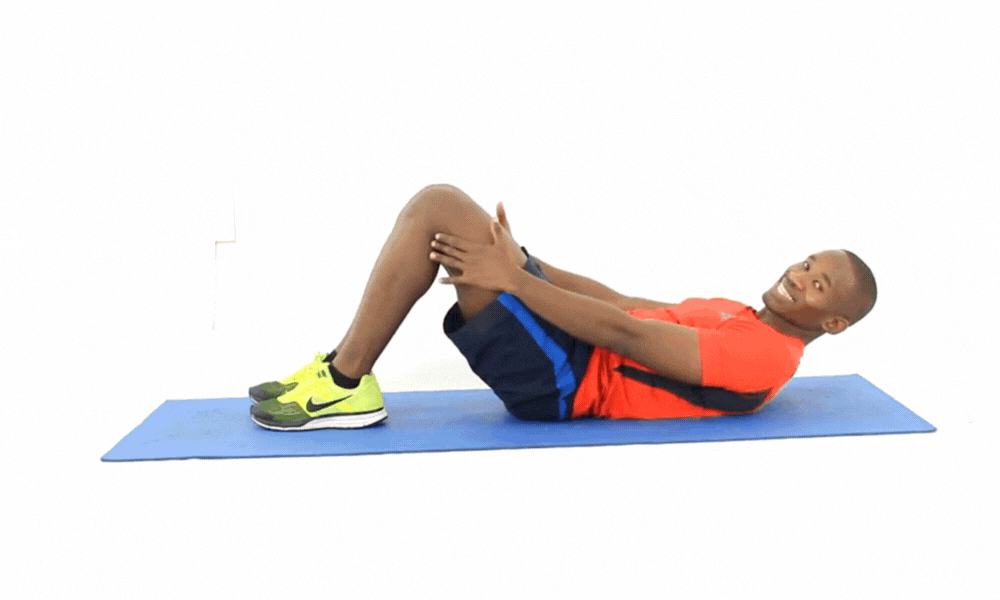
Instructions:
- Lie face up on a mat with knees and hips bent at 90 degrees.
- Position both of your arms straight behind your head while keeping your elbows straight.
- Engage your core by drawing your tummy in and pelvic floor muscles up.
- Put your tongue on the roof of your mouth; this will stop the muscles in the front of your neck from overworking.
- Tuck your chin gently towards your chest and lift your shoulders and shoulder blades off the mat. Keeping your core engaged and hands positioned behind your head, lift your torso as far toward your knees as you can.
- Lower back down with control so that your shoulder blades are once again on the mat.
Reverse Crunch
This motion of moving the bottom of your torso upwards activates the Rectus Abdominis, emphasizing the lower abs (5).
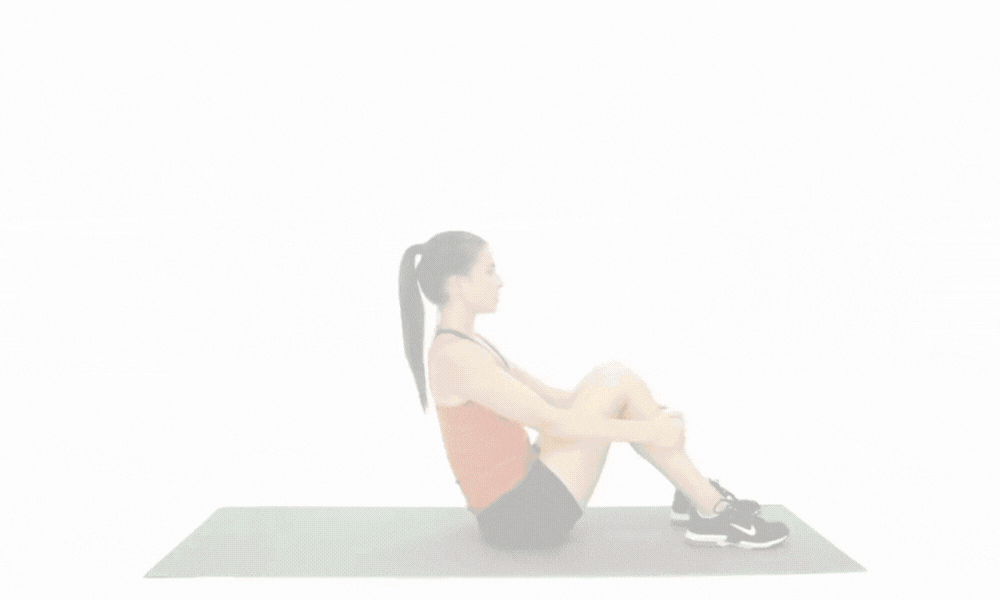
Instructions:
- Lie on your back with your knees bent.
- Engage your core by drawing your tummy in and pelvic floor muscles up.
- Lift your legs so that your knees are directly above your hips and bent at 90 degrees. Gently push your spine towards the mat.
- Keeping your core engaged and your spine in a neutral position (don’t let it curve away from the mat), lower both legs down together.
- Keep movements slow and controlled throughout.
V Sit Up
A progression to the Reverse Curl (5). These bodyweight ab workouts are great for developing your lower abs.
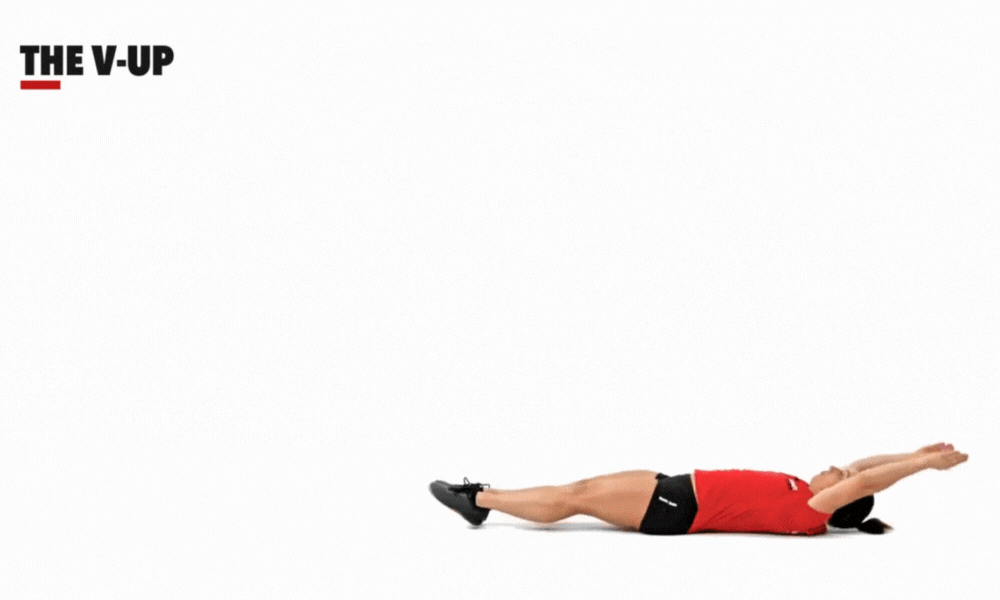
Instructions:
- Lie face up on a mat with legs straight and flat on the mat.
- Engage your core by drawing your tummy in and pelvic floor muscles up.
- Put your tongue on the roof of your mouth; this will stop the muscles in the front of your neck from overworking.
- Simultaneously lift your torso and your feet from the mat and bring them as close together above your hips as possible.
- Lower back down with control so that your shoulder blades and legs are once again on the mat.
Side Plank (on feet or knees)
More so than a side crunch or oblique crunch, this will engage both Internal and External Obliques (6). This is a great oblique exercise.
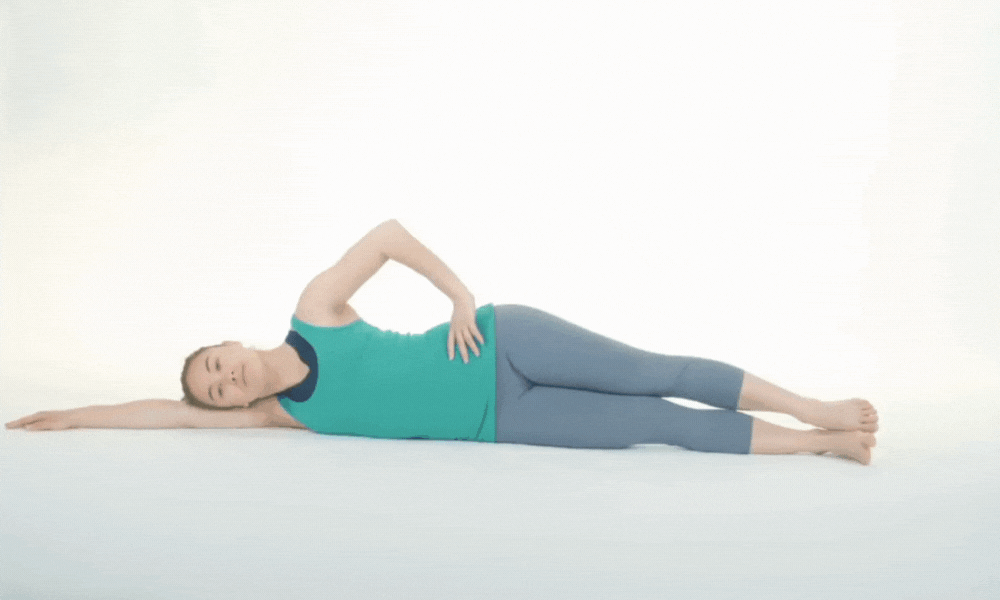
Instructions:
- Come down with one elbow and the outside of your corresponding foot on a mat. Your feet, knees, hips, chest, and head should all be facing sideways. Your body should form a straight line up.
- Engage your core by drawing your tummy in and pelvic floor muscles up.
- Hold this position.
Side Plank with Rotation
A progression to the Side Plank. This is a more advanced oblique exercise than you see above.
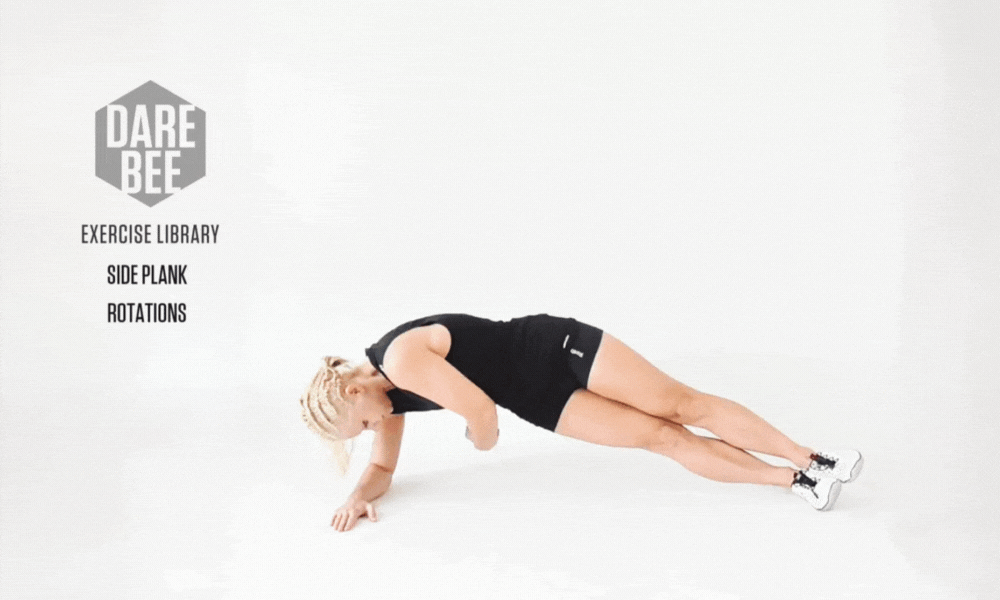
Instructions:
- Come down with one elbow and the outside of your corresponding foot on a mat. Your feet, knees, hips, chest, and head should all be facing sideways. Your body should form a straight line up.
- Engage your core by drawing your tummy in and pelvic floor muscles up.
- Rotate the top of your torso downward until you feel the lower half of your torso engaged at a desired level.
- Return to the starting position and repeat.
Low Plank (on feet or knees)
When performed with proper technique, this exercise has been shown to simultaneously engage the Obliques and Rectus Abdominis at a significant level (6).
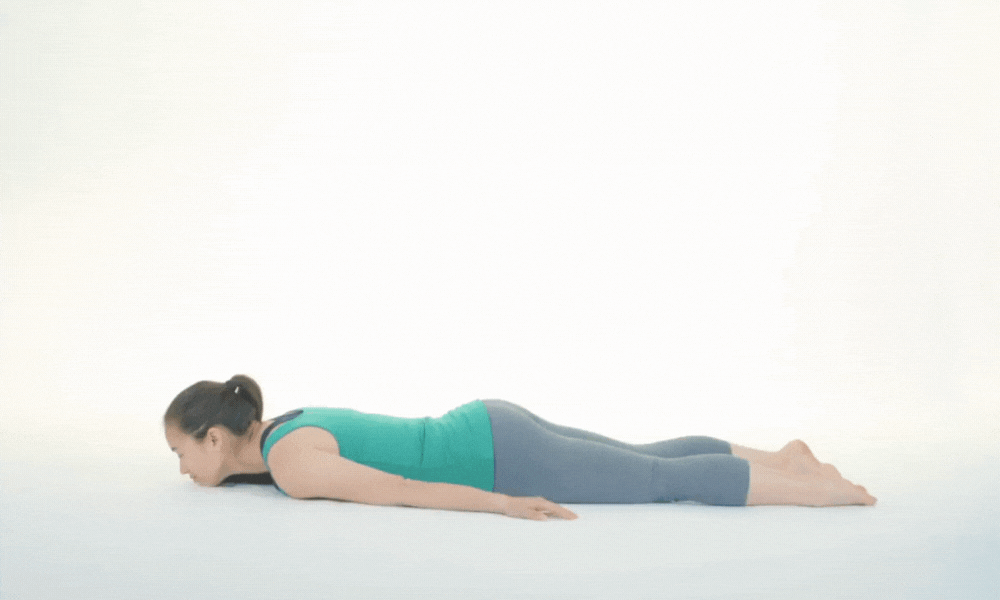
Instructions:
- Come down so that your elbows, feet, and hands are touching the floor.
- Engage your core by drawing your tummy in and pelvic floor muscles up.
- Keep your hips down so your body is flat from your ankles to your head.
- Hold.
Low Plank/High Plank on Feet with Lateral Reach
A progression to the Low Plank (6).
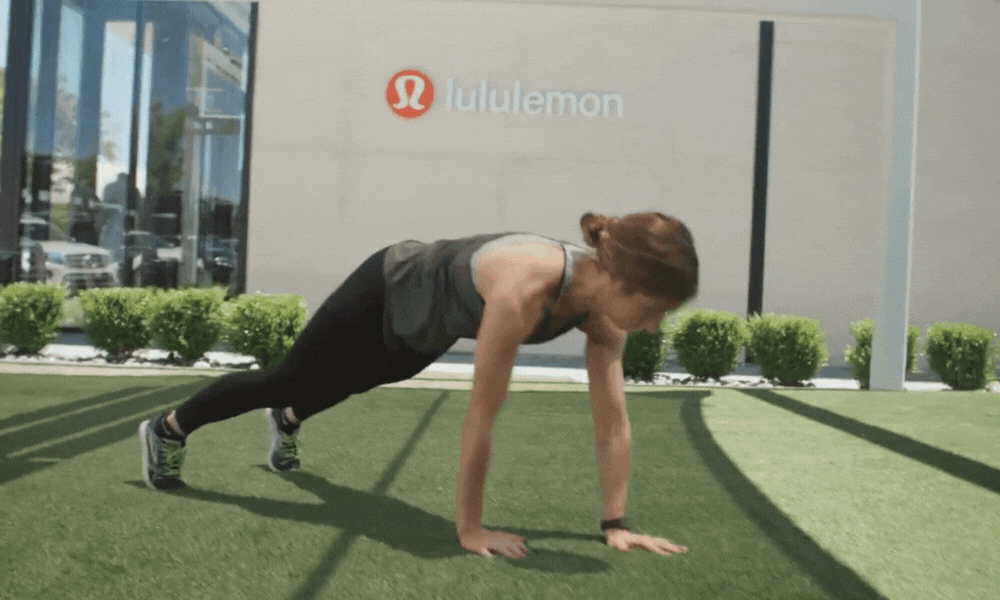
Instructions:
- Come down so that your elbows (or hands if doing a high plank), feet, and hands are touching the floor.
- Spread your feet to shoulder width.
- Engage your core by drawing your tummy in and pelvic floor muscles up.
- Keep your bum down so your body is flat from your ankles to your head.
- Lift one arm out directly to your side to be perpendicular to your torso.
- Hold your arm in this position for 3-5 seconds while keeping your hips and torso parallel to the ground.
- After resting your arm, return to the starting position to repeat on the other side.
Now that you know what bodyweight ab workouts work, you can put it all together. Below is a beginner, and a more advanced circuit you can do to help build your core strength.
Body Weight Ab Workouts: Beginner Circuit
Perform the below exercises back-to-back and rest for 1-2 minutes after completion. For maximal results, complete the circuit 3-4 rounds total, 2-3 days per week.
- Traditional Crunch: 18-20 reps
- Reverse Crunch: 12-15 reps
- Side Plank (on knees or feet): 20-30 seconds (each side)
- Low Plank (on knees or feet): 30-45 seconds
OR
Low Plank with Lateral Reach: 8 reaches holding 3-5 seconds (each side)
REST for 1-2 minutes and REPEAT.
Body Weight Ab Workouts: Advanced Circuit
Perform the below exercises back-to-back and rest for 1-2 minutes after completion. For maximal results, complete the circuit 3-4 rounds, at least 3 days a week.
- Advanced Crunch: 16-20 reps with 3-5 second holds in the up position
- V Sit Up: 12-16 reps
- Side Plank with Rotation: 12-16 reps (each side)
- High OR Low Plank with Lateral Reach: 8-12 reaches holding 3-5 seconds (each side)
REST for 1-2 minutes and REPEAT.
Looking for more workout routines? Try our article on intermediate workout routines!
In conclusion, there are several exceptionally effective bodyweight ab exercises. You do not need fancy equipment or machines in order to reach your desired core strength or aesthetic goals. A comprehensive ab or core program with both isolation and integrative core exercises will be extremely helpful. Perform the exercises listed above and apply the progressions as you see fit. The form is key, so be sure to regress any exercise if you experience any lower back pain (try Pro Inversion Therapy if you experience back pain). And perhaps the best part about these exercises is that you can complete them in the comfort of your own home!
3 Amazing Set Activewear Brand Picks for the Summer
We all know that moving our bodies is ideal for our wellness, but sometimes we want…
A Beginner’s Guide to Creatine Gummies: Empowering Wellness
In the pursuit of optimal health and fitness, individuals often seek effective strategies to enhance…
Core Ball Exercises: 5 Creative Ways You Can Tone Your Stomach Effectively
Core Ball Exercises: 5 Creative Ways You Can Tone Your Stomach Effectively If you want…
8 Common Fitness Myths: Unveiling the Truth Behind Exercise Misconceptions
Unveiling the Truth Behind Exercise Misconceptions! The world of fitness has many dos and don’ts….
9 Healthy Postpartum Diet Tips for Post-Pregnancy Weight Loss
Having a baby and becoming a mother are some of the most amazing experiences that…
What is the most effective ab exercise?
When examining the muscle activity in the abdominals, the bicycle crunch was found to be the most efficient stomach workout. Lay on your back with your lower back pressed into the floor, raise your knees up to your chest, and lift your shoulder blades off the floor to complete a bicycle crunch.
Do ab workouts reduce belly?
There is proof that working your abs alone won’t help you shed belly fat. Use a combination of resistance training, such as lifting weights, and aerobic exercise to reduce body fat throughout the entire body. Eat a balanced diet that is high in protein, fiber, and portion control in addition; they are all known to help reduce body fat.
What are 2 good ab exercises?
The crunch, which tightens the more superficial abs—the rectus abdominis down the middle and the obliques along the sides—and the plank, which works the deep, corset-like transverse abdominis, continue to be the gold standards of core strengthening.
References
- Schoffstall JE(1), Titcomb DA, Kilbourne BF. “Electromyographic response of the abdominal musculature to varying abdominal exercises”. Journal of Strength and Conditioning Research, 2010 Dec;24(12):3422-6. doi: 10.1519/JSC.0b013e3181e74315.
- Saeterbakken AH, Chaudhari A, van den Tillaar R, Andersen V (2019) “The effects of performing integrated compared to isolated core exercises”. PLoS ONE 14(2): e0212216. https://doi.org/10.1371/journal.pone.0212216.
- Lippert, Lynn. Clinical Kinesiology and Anatomy. 5th ed., F.A. Davis, 2011.
- Rutkowska-Kucharska, A and Szpala, A. ”Electromyographic muscle activity in curl-up exercises with different positions of upper and lower extremities”. Journal of Strength Cond Research, 24(11): 3133–3139, 2010
- Willett, GM, et al. “Relative Activity of Abdominal Muscles during Commonly Prescribed Strengthening Exercises”. Journal of Strength and Conditioning Research, 15, Nov. 2001, ncbi.nlm.nih.gov/pubmed/11726260
- Gottschall, Jinger S, et al. “Integration Core Exercises Elicit Greater Muscle Activation than Isolation Exercises.” Journal of Strength and Conditioning Research, Mar. 2013. Journals.lww.com/nsca-jscr/fulltext/2013/03000/Integration_Core_Exercises_Elicit_Greater_Muscle.5.aspx#pdf-link.
This article is part of the “Body Toning Series.” Click here to learn more.

